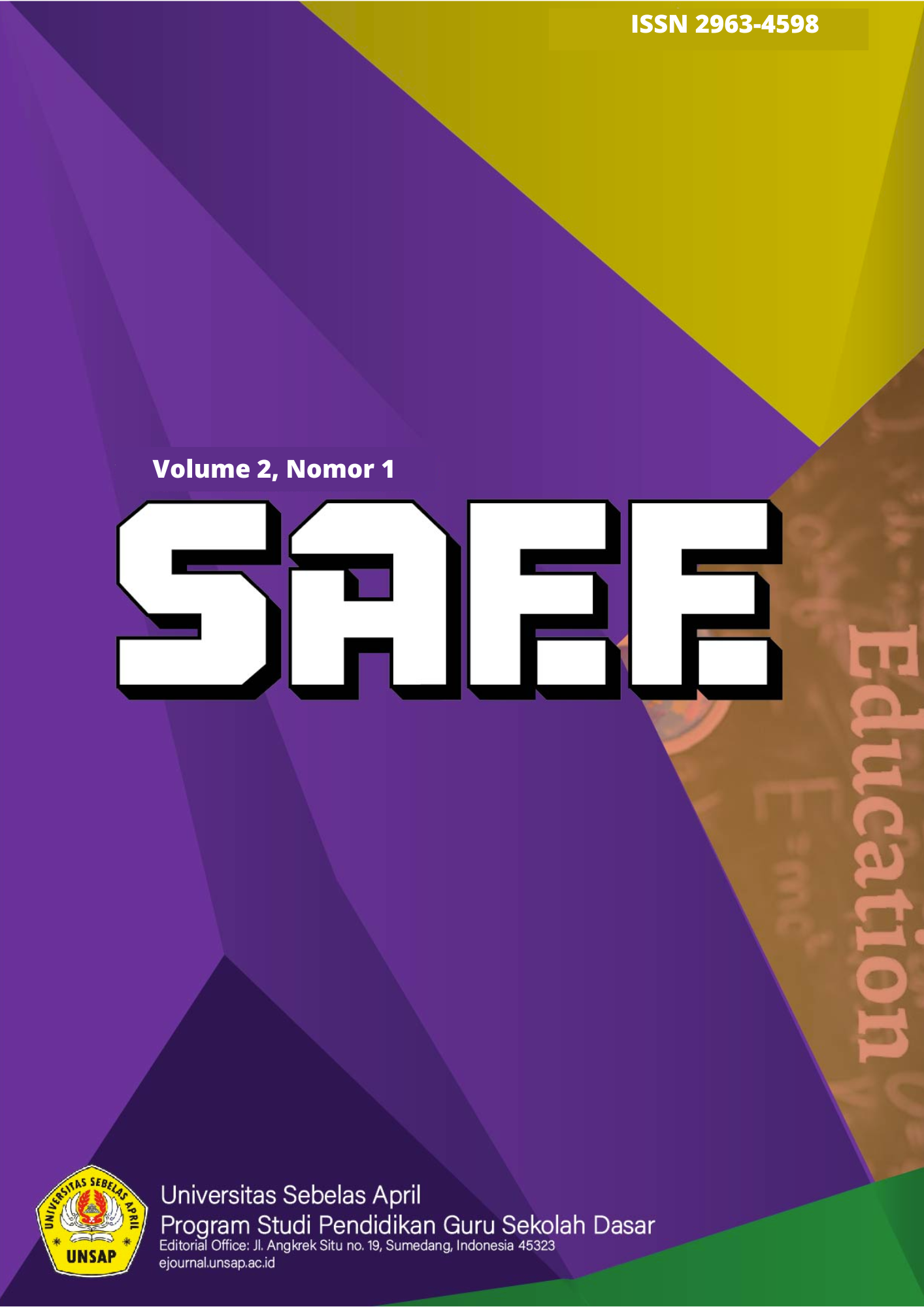PENERAPAN MODEL PROBLEM BASED LEARNING UNTUK MENGETAHUI GAMBARAN KEMAMPUAN BERPIKIR KRITIS SISWA SEKOLAH DASAR
Keywords:
Kemampuan Berpikir Kritis, Model Project Based Learning (PJBL), Siswa Kelas IV Sekolah DasarAbstract
The ability to think critically is one of the skills that is needed in the era of the industrial revolution 4.0. In this study the authors focused on the application of problem-based learning models to social education material on the meaning of the Proclamation of Independence for class VI SDS YAK (Family Charity Foundation) Parongpong District, West Bandung Regency. The purpose of this study was to determine the effect of applying the problem based learning model on the ability to think critically about the meaning of the Proclamation of Independence. This research is motivated by the lack of critical thinking skills in grade VI elementary school students. This is due to a lack of interest in the material being explained and also a lack of teacher creativity in using or applying media and learning models. Based on these circumstances the author took initiative steps or can also be called a solution to overcome these problems, namely by using or implementing a problem-based learning model (PBL) or what is commonly called problem-based learning. By applying the problem based learning model, it is hoped that it can improve the thinking skills of grade VI elementary school students. The research method used is a qualitative research method. The sample used in this study was class VI SDS YAK students. Data processing techniques are qualitative data in the form of observations, interviews and questionnaires which are carried out systematically through the elaboration of categorical data and synthesis.
References
Syamsidah., Suryani, H. (2018), Buku model problem based learning (PBL) Mata Kuliah Pengetahuan Bahan Makanan, Yogyakarta: Deepublish.
Zakiah, L., Lestari, I. (2019), Berpikir kritis dalam konteks pembelajaran, Bogor: Erzatama Karya Abadi.
Rahmad. (2016), Kedudukan ilmu pengetahuan sosial (IPS) pada sekolah dasar, MUALLIMUNA: Jurnal Madrasah Ibtidaiyah, 2(1), 68-74.
Affandy, A., Aminah, N., S. & Supriyanto, A. (2019), Analisis keterampilan berpikir kritis siswa pada materi fluida dinamis di SMA Batik 2 Surakarta, Jurnal Materi dan Pembelajaran Fisika (JMPF), 9(1), 26.
Nuryanti, L., Zubaidah, S., & Markus, D. (2018), Analisis kemampuan berpikir kritis siswa SMP, Jurnal Pendidikan, 3(2), 156.
Esema, D., Susari, E., & Kurniawan, D. (2012), Problem based learning, Satya Widya, 28(2), 167.
Nuraini, F., Kristin, F. (2017), Penggunaan model problem based learning (PBL) Untuk meningkatkan hasil belajar IPA siswa kelas 5 SD, e-jurnalmitrapendidikan, 1(4), 371-372.
Abdussamad, Z. (2021), Metode Penelitian Kualitatif, Syakir Media Press.
Rosaliza, M. (2015), Wawancara, Sebuah Interaksi Komunikasi dalam Penelitian Kualitatif, Jurnal Ilmu Budaya, 11(2), 71.
Rachmadtullah, R. (2015), Kemampuan Berpikir Kritis Dan Konsep Diri Dengan Hasil Belajar Pendidikan Kewarganegaraan Siswa Kelas V Sekolah Dasar, Jurnal Pendidikan Dasar, 6(2), 289
Rahmadani. (2019), Metode Penerapan Model Pembelajaran Problem Based Learning (PBL), Lantanida Journal, 7(1), 80.
Purwati, R., Hobri., & Fatahillah, A. (2016), Analisis Kemampuan Berpikir Kritis Siswa dalam Menyelesaikan Masalah Persamaan Kuadrat pada Pembelajaran Model Creative Problem Solving, Kadikma, 7(1), 84.
Shabrina, N., Darmadi., & Sari, R. (2020), Pengaruh Motivasi dan Stres Kerja Terhadap Kinerja Karyawan CV Muslim Galeri Indonesia, Jurnal Madani, 3(2), 167.
Nurkholis. (2013), Pendidikan dalam Upaya Memajukan Teknologi, Jurnal Kependidikan, 1(1), 25.
Rahman, Abd., Munandar, S, A, Fitriani, A, Karlina, Y., & Yumriani. (2022), Pengertian Pendidikan, Ilmu Pendidikan dan Unsur-unsur Pendidikan, Al Urwatul Wutsqa, 2(1), 6.
Helmiati. (2012), Model Pembelajaran, Yogyakarta: Aswaja Pressindo.
Adi, S,S., Junining, E. (2013), Kemampuan Berpikir Kritis dalam Membaca Serta Kesesuaiannya dengan Intelegensi Mahasiswa Program Studi Sastra Inggris, Erudio, 2(1), 59.
Sofyan, H., Wagiran., Komariah, K., & Triwiyono, E. (2017), Problem Based Learning dalam Kurikulum 2013, Yogyakarta: UNY Press.
Agustinaa, M. (2018), Problem Based Learning (PBL): Suatu Model Pembelajaran Untuk Mengembangkan Cara Berpikir Kreatif Siswa, At-Ta’dib: Jurnal Ilmiah Pendidikan Agama Islam, 10(2), 166.
Hayun, M., Syawaly, A, M. (2020), Pengaruh Penerapan Model Pembelajaran Problem Based Learning Terhadap Kemampuan Representasi Matematis Siswa Sekolah Dasar, Jurnal Instruksional, 2(1), 11.
Downloads
Published
How to Cite
Issue
Section
License
Copyright (c) 2023 Sebelas April Elementary Education

This work is licensed under a Creative Commons Attribution-NonCommercial-ShareAlike 4.0 International License.








